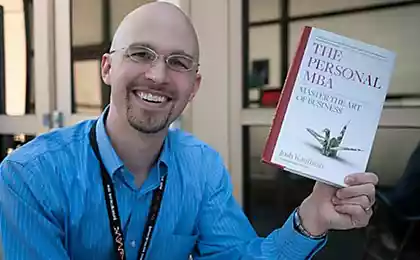347
The Laws of Vileness: 11 Empirical Principles
The Laws of Vileness: 11 Important Empirical Principles Scientific laws are lacking for all phenomena. How do you explain the butter drops down? Why does the equipment always break when the customer arrives? Is there a global conspiracy, or is there a government error? In order to systematize the world disorder, people of various specialties formulate their own laws, which take root well.

Murphy's Law
“If something bad can happen, it will happen.”
Murphy’s law is also known as the law of meanness and the law of sandwiches. It was formulated in 1949 by Major Edward Murphy, who served at U.S. Air Force Base in California. While working on a project to determine the maximum overload that a person can endure, Murphy argued that local technicians can screw up anywhere they can mess up. According to legend, the first major noted this when he saw how the propeller of the aircraft suddenly began to rotate in the wrong direction. That day, it turned out that technicians had installed engine parts backwards.
Occam's razor
One should not multiply things without necessity.
Occam’s razor is also known as the “principle of frugality” and the “law of economy.” “Multiplety should never be assumed unnecessarily,” argued the English Franciscan monk, philosopher William Occam, “but whatever can be explained from the difference of matter on a number of grounds—it can also be explained equally well, or even better, by a single foundation.” In modern science, Occam's razor is understood as the statement that The simplest explanation should be considered correct. a phenomenon, if they do not logically contradict each other.
Hanlon's razor
“Never ascribe to malice what may well be explained by stupidity.”
The quote was first used by Robert Hanlon as an epigraph to a collection of various jokes related to Murphy's Law, published in 1980 as Murphy's Second Book of Laws, or More Reasons Why Things Go Bad. The epigraph was invented by analogy with Occam’s Razor. The UK has its own equivalent of this rule. "Fucked, not a conspiracy.". The author of the words that then became the basis for the law is Margaret Thatcher's spokesman Bernard Ingham. Many journalists are very fond of the government conspiracy theory. I assure you, their material would have been much more credible if they had firmly held to the theory that the government had failed.”
Parkinson's First Law
Work fills the time allotted to it.
In other words, an old woman can spend a whole day writing a letter to her niece, even if a busy gentleman spends three minutes writing it. This law was formulated by historian Cyril Northcote Parkinson in a satirical article that appeared in the British magazine The Economist in 1955. At that time, he was primarily interested in the bureaucracy and mechanics of the work of enterprises and government offices. In particular, Parkinson argued: An institution that employs more than a thousand employees is becoming a perpetual empire creating so much inner work that it no longer needs contact with the outside world.
Peter's principle
“In a hierarchical system, every worker rises to the level of incompetence.”
Educator Lawrence Peter, who studied hierarchical organization, voiced this principle in the book of the same name. He argued that a person who works in a hierarchical system will move up the career ladder until he reaches a level where he can no longer understand anything. It will stay there until it leaves the system.

Godwin's Law
As the discussion grows, the probability of using a comparison with Nazism or Hitler tends to be one.
The future chief lawyer of the Wikimedia Foundation and editor of Wikipedia, Michael Godwin, argued in 1990 that any heated dispute on electronic networks could sooner or later come to compare one side with the Nazis. On the Usenet network, through which Godwin made his observation, there was even a tradition that when such a comparison was made, the discussion was considered complete and the party that allowed it was the loser.
Gates' Law
“Programs are twice as slow every year and a half.”
According to Microsoft founder Bill Gates, “Software gets slower faster than computers get faster.” Bill Gates argued that the reasons for this pattern are elementary: the addition of unnecessary functions, poorly written code, reluctance to refine programs, poor management and frequent change of team.
The one per cent rule
“For every person who posts a message online, there are 99 people who don’t respond.”
This rule was named in 2006 by bloggers Ben McConnell and Jackie Huba. However, the phenomenon was noted before that. For example, in 2005, a study of jihadi forums found that 87% of users had never posted to them, 13% decided to publish once, 5% created posts 50 or more times, and only one time.1% have done it 500 times or more.
The Pareto Principle
“20% of efforts produce 80% of results, and the remaining 80% of efforts only 20% of results.”
This pattern was revealed by the Italian economist and sociologist Vilfredo Pareto in 1897. The principle is relevant in management and self-management today: any startup should know that by choosing the right minimum of necessary actions, you can achieve a significant part of the planned results, and everything else will be ineffective.
"Bald is hairy."
The bald ruler of Russia will be followed by a hairy one.
Russian political joke based on the pattern of alternation of heads of state in the country over the past 187 years. The principle has been in force since 1825, when Nicholas I ascended the throne, who could not boast of luxurious curls, and paradoxically acts to this day. According to the law, the next president of the Russian Federation must be “hairy”.
Visit effect
If tests of a flawlessly working system are carried out in front of the customer, then it will definitely fail.
The law is also known as the “presence effect,” the “demonstration effect,” and the “telemaster effect.” It also works in the opposite direction: faulty appliances during the visit of a repair specialist often begin to work like a clock.
In physics, the Pauli effect is also known. It is expressed in the fact that in the presence of certain people (in particular, Nobel laureate Wolfgang Pauli), any equipment breaks down, even if they are not interested in it working. published
Author: Natalia Kienya
P.S. And remember, just by changing your consciousness – together we change the world!
Source: theoryandpractice.ru/posts/7143-zakony-podlosti-11-vazhnykh-empiricheskikh-printsipov

Murphy's Law
“If something bad can happen, it will happen.”
Murphy’s law is also known as the law of meanness and the law of sandwiches. It was formulated in 1949 by Major Edward Murphy, who served at U.S. Air Force Base in California. While working on a project to determine the maximum overload that a person can endure, Murphy argued that local technicians can screw up anywhere they can mess up. According to legend, the first major noted this when he saw how the propeller of the aircraft suddenly began to rotate in the wrong direction. That day, it turned out that technicians had installed engine parts backwards.
Occam's razor
One should not multiply things without necessity.
Occam’s razor is also known as the “principle of frugality” and the “law of economy.” “Multiplety should never be assumed unnecessarily,” argued the English Franciscan monk, philosopher William Occam, “but whatever can be explained from the difference of matter on a number of grounds—it can also be explained equally well, or even better, by a single foundation.” In modern science, Occam's razor is understood as the statement that The simplest explanation should be considered correct. a phenomenon, if they do not logically contradict each other.
Hanlon's razor
“Never ascribe to malice what may well be explained by stupidity.”
The quote was first used by Robert Hanlon as an epigraph to a collection of various jokes related to Murphy's Law, published in 1980 as Murphy's Second Book of Laws, or More Reasons Why Things Go Bad. The epigraph was invented by analogy with Occam’s Razor. The UK has its own equivalent of this rule. "Fucked, not a conspiracy.". The author of the words that then became the basis for the law is Margaret Thatcher's spokesman Bernard Ingham. Many journalists are very fond of the government conspiracy theory. I assure you, their material would have been much more credible if they had firmly held to the theory that the government had failed.”
Parkinson's First Law
Work fills the time allotted to it.
In other words, an old woman can spend a whole day writing a letter to her niece, even if a busy gentleman spends three minutes writing it. This law was formulated by historian Cyril Northcote Parkinson in a satirical article that appeared in the British magazine The Economist in 1955. At that time, he was primarily interested in the bureaucracy and mechanics of the work of enterprises and government offices. In particular, Parkinson argued: An institution that employs more than a thousand employees is becoming a perpetual empire creating so much inner work that it no longer needs contact with the outside world.
Peter's principle
“In a hierarchical system, every worker rises to the level of incompetence.”
Educator Lawrence Peter, who studied hierarchical organization, voiced this principle in the book of the same name. He argued that a person who works in a hierarchical system will move up the career ladder until he reaches a level where he can no longer understand anything. It will stay there until it leaves the system.

Godwin's Law
As the discussion grows, the probability of using a comparison with Nazism or Hitler tends to be one.
The future chief lawyer of the Wikimedia Foundation and editor of Wikipedia, Michael Godwin, argued in 1990 that any heated dispute on electronic networks could sooner or later come to compare one side with the Nazis. On the Usenet network, through which Godwin made his observation, there was even a tradition that when such a comparison was made, the discussion was considered complete and the party that allowed it was the loser.
Gates' Law
“Programs are twice as slow every year and a half.”
According to Microsoft founder Bill Gates, “Software gets slower faster than computers get faster.” Bill Gates argued that the reasons for this pattern are elementary: the addition of unnecessary functions, poorly written code, reluctance to refine programs, poor management and frequent change of team.
The one per cent rule
“For every person who posts a message online, there are 99 people who don’t respond.”
This rule was named in 2006 by bloggers Ben McConnell and Jackie Huba. However, the phenomenon was noted before that. For example, in 2005, a study of jihadi forums found that 87% of users had never posted to them, 13% decided to publish once, 5% created posts 50 or more times, and only one time.1% have done it 500 times or more.
The Pareto Principle
“20% of efforts produce 80% of results, and the remaining 80% of efforts only 20% of results.”
This pattern was revealed by the Italian economist and sociologist Vilfredo Pareto in 1897. The principle is relevant in management and self-management today: any startup should know that by choosing the right minimum of necessary actions, you can achieve a significant part of the planned results, and everything else will be ineffective.
"Bald is hairy."
The bald ruler of Russia will be followed by a hairy one.
Russian political joke based on the pattern of alternation of heads of state in the country over the past 187 years. The principle has been in force since 1825, when Nicholas I ascended the throne, who could not boast of luxurious curls, and paradoxically acts to this day. According to the law, the next president of the Russian Federation must be “hairy”.
Visit effect
If tests of a flawlessly working system are carried out in front of the customer, then it will definitely fail.
The law is also known as the “presence effect,” the “demonstration effect,” and the “telemaster effect.” It also works in the opposite direction: faulty appliances during the visit of a repair specialist often begin to work like a clock.
In physics, the Pauli effect is also known. It is expressed in the fact that in the presence of certain people (in particular, Nobel laureate Wolfgang Pauli), any equipment breaks down, even if they are not interested in it working. published
Author: Natalia Kienya
P.S. And remember, just by changing your consciousness – together we change the world!
Source: theoryandpractice.ru/posts/7143-zakony-podlosti-11-vazhnykh-empiricheskikh-printsipov
The effect of Franklin: how to win the favor of important and busy people
A useful exercise in Achilles bursitis and piriformis spasm























